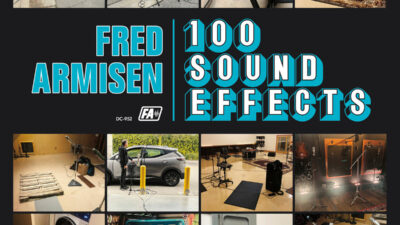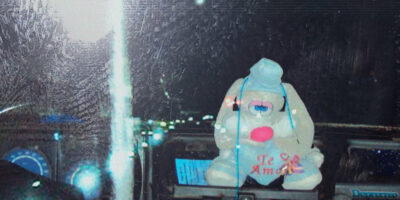This article previous appeared on Crossfader
We’re here to tell you what’s hot and what’s not in this week’s music roundup

DJDS – BIG WAVE MORE FIRE
Genre: Alternative R&B, Electropop
Favorite Tracks: “Trees on Fire,” “I Get By,” “I Heard,” “Pick Me Up,” “Falling,” “Love”
It’s amazing what a Kanye collaboration can do. Just over two years ago, Jerome Potter and Sam Griesemer went from a virtually unknown Los Angeles house duo to producing five songs on Kanye West’s THE LIFE OF PABLO, winning a Grammy for their work on “Ultralight Beam.” Despite their critical contribution to the superstar’s seventh solo album, Potter and Griesemer failed to get much attention to their work as DJDS. The duo had clearly tried to lean into what they had hoped would be a curious audience with their sophomore record, STAND UP AND SPEAK, which was released just two weeks before PABLO. It was a decided turn towards pop, eschewing the sample-heavy house of their debut record. However, the Kanye connection caught the eyes of plenty of artists, and it shows on BIG WAVE MORE FIRE, DJDS’s poppiest release to date.
The duo’s third record has a deep roster of 12 vocal features including The-Dream, Empress Of, Khalid, and Vic Mensa, many of which outshine the production work on their respective tracks. Amber Mark’s vocals on “Trees on Fire” supply virtually all of the song’s melody, which is not a knock against DJDS. That’s exactly what they were going for on this album, one they say they’ve been wanting to make since the inception of the group. And while the heat-seeking house tracks like “One Who Lost” and “Never Win” from FRIEND OF MINE are nowhere to be found on BIG WAVE MORE FIRE, there are still pure, euphoric dance tracks. “Pick Me Up” is the unmatched pants-on-head-crazy portion of the record. It starts slow with Vory’s sulky Auto-Tune before speeding up with crisp, snappy percussion and Vic Mensa’s chorus that ultimately take a backseat to triumphant, blaring horns that dominate the track the rest of the way. It’s the most euphoric song DJDS has ever written, and it makes up for the complete lack of techno and house they so skillfully produced on their debut.
The two other standout performances come from Empress Of and Kelly Zutrau for their vocals on “Love” and “Falling,” respectively. Empress Of’s cover of Lana Del Rey is a remarkably brighter and dancier rendition that doesn’t reach the emotional highs of the original but is a very fun closing statement to the album. Zutrau’s hook on “Falling” is simple but precisely executed and totally surpasses Marco McKinnis’s verses. These, as well as the many other features, are strong indicators that DJDS has transitioned from beatmakers to taste curators, and while the duo doesn’t turn in a record quite as complex or interesting as their debut, it’s a fun album with plenty of replay value. [Ryan Moloney]
Verdict: Recommend
 Five Finger Death Punch – AND JUSTICE FOR NONE
Five Finger Death Punch – AND JUSTICE FOR NONE
Genre: “Heavy” Metal
Favorite Tracks: “Fire In the Hole,” “It Doesn’t Matter”
Five Finger Death Punch’s success depresses me to no ends. There’s so much great, brutal, challenging metal out there, and yet people gravitate towards a band that represents everything I pushed against when I wrote about using profanity in metal. The ego on these guys has always been massive; you know they were so proud of themselves for songs titles like “Sham Pain” and the oh-so-clever Metallica reference of the album title. Funny enough, any comparisons between AND JUSTICE FOR ALL and anything FFDP have ever churned out only showcases how small and petty their music is. Some metal is themed around the apocalypse, the war between Heaven and Hell, or the terror of existence itself, whereas Ivan Moody alternates between wallowing in his own self-pity and spewing insults that a third grade bully would find beneath them.
At least some of their earlier releases had some impressive blast beats or forceful shouts from Moody. Nothing here has any presence, as the drums plonk at a sluggish tempo and the guitars are desperate for any breathing room or texture. Moody is completely checked out, though he’s not helped by ubiquitous filters and way too much acoustic schmaltz. You can’t take his struggles with alcoholism or macho posturing seriously when it’s followed by “I Refuse,” which is so full of vague platitudes it might as well be a Christian Rock song. The diseased cherry on top is a dour cover of The Offspring’s “Gone Away” that has none of the original’s anguished vocals or melodic steadiness; Disturbed, all is forgiven for “The Sound of Silence.” Even if you’re a diehard FFDP fan, I can’t imagine that all the power ballads and transparent apathy will appeal to you, and anyone looking for their WWE-soundtracking, beer-chugging, headbanging fix is better served elsewhere. At least they didn’t call someone a f***** this time. [Blake Michelle]
Verdict: Do Not Recommend

Gas – RAUSCH
Genre: Ambient Techno
Favorite Tracks: N/A
My personal favorite record of last year, Gas’ NARKOPOP, is just as all-consuming, staggering, and esoteric now as it was then, a release to return to in the wee hours when self-reflection is of the highest priority. But I must admit that my trepidations were high upon learning that Wolfgang Voigt was going to take a break 16 years less than the one between 2000’s POP and last year’s standout release, afraid that this sort of late-game career whiplash was a product of necessity and nothing more. Ultimately, my worries proved cynical: RAUSCH is its own beast to be enjoyed and dissected separate from the understandably vast reaches of its predecessors, albeit a Gas release that approaches maximum capacity: long story short, unless you’ve cut your teeth on ambient or ambient techno for awhile now, don’t start here. That sounds harsh when written down, but it must be mentioned at one point or another that when it has a beat at all, RAUSCH quite literally has two beats throughout, both of which are only very slightly differentiated. A highly minimalist effort, making extended use of subdued but subtly building electronic manipulations, permutations, and recapitulations, it goes without saying that RAUSCH needs to be appreciated as a continuous piece, but true rewards will only reveal themselves when you take the time and effort to appreciate it, which leads to unfortunate caveats: I’ve been running this ship for nigh three years now, and the analytics don’t lie as to what you people actually like. Nevertheless, it’s a record that’s impossible not to get lost in if you spend some time with it, and the crepuscular mental state it induces is commendable in its ruthless intentionality. The complete antithesis to its title, which translates to “frenzy,” RAUSCH is as soothing and hypnotic as Gas ever was, albeit this time less apologetic in its introspective navel-gazing. But I would never dream of calling it anything less than beautiful, the kind of thoughtful, carefully constructed musical experience that only the top tier of atmospheric electronic can achieve. I have the funniest feeling you won’t oblige, but I really would like you to give Gas a chance, barring the fact that if you’re coming in blind I’d steer you more firmly in the way of NARKOPOP. [Thomas Seraydarian]
Verdict: Recommend

Stephen Malkmus and The Jicks – SPARKLE HARD
Genre: Alternative Rock
Favorite Tracks: “Future Suite,” “Middle America,” “Rattler,” “Refute,” “Difficulties – Let Them Eat Vowels”
Grown-up life has treated Pavement’s Stephen Malkmus well. Where so many aging rockers, especially in the indie scene, find the quality of their art diminishing and their cool factor dwindling after their first band’s breakup, Malkmus is in the rare echelon of cool guys who can both have kids and still write a damn good album. Malkmus and his band The Jicks prove that their distinctively Portland, but extremely versatile, sound gets better with each year they spend as a band. “Future Suite” is clearly indebted to the upbeat cuts from BRIGHTEN THE CORNERS, hearkening to “Passat Dream.” “Refute” is the type of country love song that only a cool old guy could write, with an Americana fiddle and the endearingly relatable opening line, “this is a verse about a man who dared to fall head over heels for a woman who shared-similar interests-similar looks-similar taste in similar books.” The nasal candor of Malkmus’s songwriting was obviously a staple of Pavement’s shtick in the ‘90s, but “Refute” proves it’s a talent that’s actually improved with age. “Rattler” is beholden to CONTRA-era Vampire Weekend, complete with an Auto-Tuned Stephen talking about Facebook. Somehow it doesn’t play like a bunch of dads in Oregon that heard “Holiday” in a commercial and decided to write a knock off, instead showing Malkmus and his band paying tribute to a breed of indie rock that simply would not exist without them. It’s a heartwarming nod to a generation of self-aware songwriters that Pavement is such a quintessential element in the emergence of. The album’s highlight, however, is its closing track “Difficulties – Let Them Eat Vowels.” After an intro that plays like a long lost horn driven SLANTED ENCHANTED outtake, the track emerges into Neu!-esque krautrock. It’s the most effectively Pavement Malkmus has sounded since the group’s 1999 breakup, but it never plays like a throwback. “Difficulties,” and SPARKLE HARD as a whole, are a perfect reminder that coolness transcends time. Even as a guy who talks openly about his wife and kids in Marc Maron interviews and shows his well-kept suburban living room to Spin, Malkmus has somehow managed to progress from the coolest slacker of the 1990s to the chillest dad of the 2010s. [Ted Davis]
Verdict: Recommend

Willie Nelson – LAST MAN STANDING
Genre: Country Blues, Americana
Favorite Songs: “Last Man Standing,” “Something You Get Through,” “Heaven Is Closed,” “I’ll Try To Do Better Next Time,” “Very Far To Crawl”
When we think about the loneliness and health issues that the elderly face, it’s hard to picture a living legend to also be afflicted by them. Unfortunately, no one is safe from late-life challenges, even Willie Nelson, who has done an amazing job of raising these issues with the same wit and reflection that have granted him success over the last six decades. At the youthful age of 85, Nelson is showing no signs of slowing down, and he opens his 68th studio album with a title track in which he comes to the realization that maybe he does want to be the last man standing.
With the tact of a mature artist, Nelson explores a thesis on old age. In “Bad Breath” you can almost feel the closeness of his wall-melting breath as he admits it’s better to be plagued with the stench than to have “than no breath at all.” Similarly dark topics of loneliness and loss are discussed on multiple songs, the most vulnerable being “Something You Get Through,” where you can hear the labor of pain in Nelson’s older vocals as he struggles with the vibrato his voice used to master, combining in beautiful unison between Alison Krauss’ fiddle and Mickey Raphael’s harmonica.
On the flip side, Nelson explores what it’s like to go out on the town as an older gentleman. There’s a sense of nostalgia as he now has to get out the door with a sore back when he’s “Ready to Roar,” but ultimately lets us know he plans on continuing to have fun despite his age. Throughout LAST MAN STANDING Nelson plays with darker topics while pairing them with livelier melodies and adding a hint of cynicism to the happier lyrics. The unavoidable reflection on one’s past actions occurs on “Heaven Is Closed,” where he slyly pretends to have a choice in where he’ll stay when “heaven is closed and hell’s overcrowded,” but actually he’s stuck on Earth until his last breath, so regardless of the outcomes of his actions in the afterlife, he has to still live his life. He even includes two heartbreak ballads about past loves (“Aint Got Nothin’” and “She Made My Day”) that make us all wonder how long the statute of limitation is for thinking back on our old exes.
Stylistically LAST MAN STANDING is diverse. Nelson has evolved from the Outlaw Country genre he famously contributed to at the beginning of his career to a predominantly blues style on LAST MAN STANDING. He incorporates rockabilly (“Last Man Standing” and “Don’t Tell Noah”), Country Swing (“Ready to Roar”), and Western waltzes (“Something You Get Through” and “I’ll Try To Do Better Next Time”) in a masterful way with the help of co-author and producer Buddy Cannon. The ending of LAST MAN is a solid conclusion in which he contemplates regret and reincarnation (“I’ll Try To Do Better Next Time”) and the grand finale is an assumption of where he’s headed; he might be the last man standing now, but he doesn’t have “Very Far To Crawl.” LAST MAN STANDING is an exploration of surviving the punches life throws us. [Liliane Neubecker]
Verdict: Recommend

Skee Mask – COMPRO
Genre: Ambient Techno
Favorite Tracks: “Rev8617,” “50 Euro to Break Boost,” “Dial 274,” “Flyby Vfr,” “Muk FM”
True to its cover, COMPRO is a frigid piece of art. From the opening moments of “Cerroverb” to the final note on “Calimance (Delay Mix),” Bryan Muller constructs heavy, frozen atmospheres sliced by breakbeats. Even at its most frantic moments, fueled by dizzyingly quick percussion, the record is anchored by moody synths that billow in the background. COMPRO is without a doubt geared more towards a solitary listening experience than a sweaty nightclub. Its most rhythmic tracks are cloudy shadows of dance tunes. The bouncing, rattly beats on “50 Euro to Break Boost” are perhaps the coziest COMPRO has to offer and make a gorgeous partner for the gloomy, rising synth melody. Unlikely pairings like this are sprinkled across the surprisingly tight 65-minute run time. “Flyby Vfr” sports a clattering breakbeat against melancholy gusts of synths that rise and fall with bits of piano ripples.
And while each track has plenty of notable moments, COMPRO is greater than the sum of its parts. Muller’s compositions are so engaging that there is rarely, if ever, an opportunity for the mind to wander, a truly incredible achievement for an hour of music that is mostly devoid of any heart-pounding moments, except for “Dial 274,” a ferocious six minutes of snarling basslines, beats, and unsettling, echoing bells. COMPRO is another step deeper into Muller’s clever brilliance and hopefully a launchpad for Ilian Tape’s brightest star. [Ryan Moloney]
Verdict: Recommend

Slow Mass – ON WATCH
Genre: Post-Hardcore
Favorite Tracks: “Gray Havens,” “Suburban Yellow,” “Oldest Youngest”
After the barnburner that was 2016’s TREASURE PAINS EP, I expected Slow Mass’s 2018 release, ON WATCH, to consist of the same intense, manic, sublime discord. And the first half here doesn’t suggest otherwise. “Gray Havens” opens with a suitably frizzy, unhinged arrangement; Mercedes Webb and Dave Collis follow, swapping subdued verse for verse until they throw reserve out the window to harmonize over some gnarly guitars. The following are the similarly fashioned “Blocks” and “Suburban Yellow.” The latter shines above the whole tracklist. It’s got an infectious, equable rhythm to begin with. Then when feathers do start getting ruffled, Webb and Collis remind us of their impressive bottling up. Over crashing guitars and cymbals, they sound as confident and collected as ever as they wax melancholic about mid-20s crises: “There’s nothing like getting up / Before dawn to start wasting your life.”
However, the band loses their focus and galvanic dynamism on the second stretch of the album. Collis does sound mentally healthier on “My Violent Years” as he dispels resurfacing dark memories, and the dreamy atmospherics of “Tunnel Vision Quest” and “G’s End” suggest a courage to head in new directions, but both lack the excitement and/or teeming ferocity that made their first EP so enjoyable. And when Slow Mass does decide to turn up the volume again like on “ED” and “Like Dead Skin,” the results are frustratingly messy. Even with all the noise and distortion, the potential companion pieces feel slack. At least on late-album slow-burner “Oldest Younger” there’s a payoff we can bang our heads too. While they manage to show some surprising restraint that could benefit them in the future, Slow Mass’ serrated edge is dulled one too many times on their full-length debut. [Nick Funess]
Verdict: Do Not Recommend

Ryley Walker – DEAFMAN GLANCE
Genre: Indie Folk, Jazz
Favorite Tracks: “Spoil With the Rest”, “In Castle Dome”, “Telluride Speed”, “Accomodations”, “22 Days”
The term “genre-bending” is probably just a little bit overused in music criticism, but it’s the only word that I can think of when I hear Ryley Walker’s DEAFMAN GLANCE. His musical style is something like early ‘70s Greenwich Village folk mixed through a filter of experimental jazz guitarists like Joe Pass and Pat Metheny and the kind of lo-fi slacker rock found on Drag City Records in the 1990s. Walker’s fingerstyle electric guitar has a remarkable mix of jazz unpredictability and rock and roll theatrics that doesn’t fail to surprise on each of DEAFMAN GLANCE’s tracks. At its best, this record is a trance-inducing, percussive dream of a thing that will appeal to fans of all sorts of musical genres.
Album closer and lead single “Spoil With The Rest” sounds a little bit like BOXER-era National if they were to lean in more to their post-rock tendencies, and is a good place to start with Walker for those who are hesitant to listen to a “jazz” musician. Other highlights are the slow-burning “22 Days,” which takes the form of a emo-ish ballad before taking a hard left into a swarming, vaguely Latin-inspired free jazz section. “Accommodations” plays truer to Walker’s roots as an experimental musician, maintaining a free-wheeling Ornette Coleman/late Coltrane-type melody opposite some squealing guitars and a flute section. DEAFMAN GLANCE is such a trip to listen to because of how familiar it sounds while dipping its toe farther than one would think into legitimate jazz aspirations. Walker seems to be crossing over into a space where he is seeking indie rock legitimacy, and it’s hard to recall a musician in the last 30 or so years who’s been able to dance between these spaces as well as he can. It’s probably just the beginning for Walker if he continues to walk down this path, but DEAFMAN GLANCE is deserving of a listen based on its singularity alone, and is more than good enough to warrant a spot on a few “Best of 2018” lists. [Adam Cash]
Verdict: Recommend
















Comments